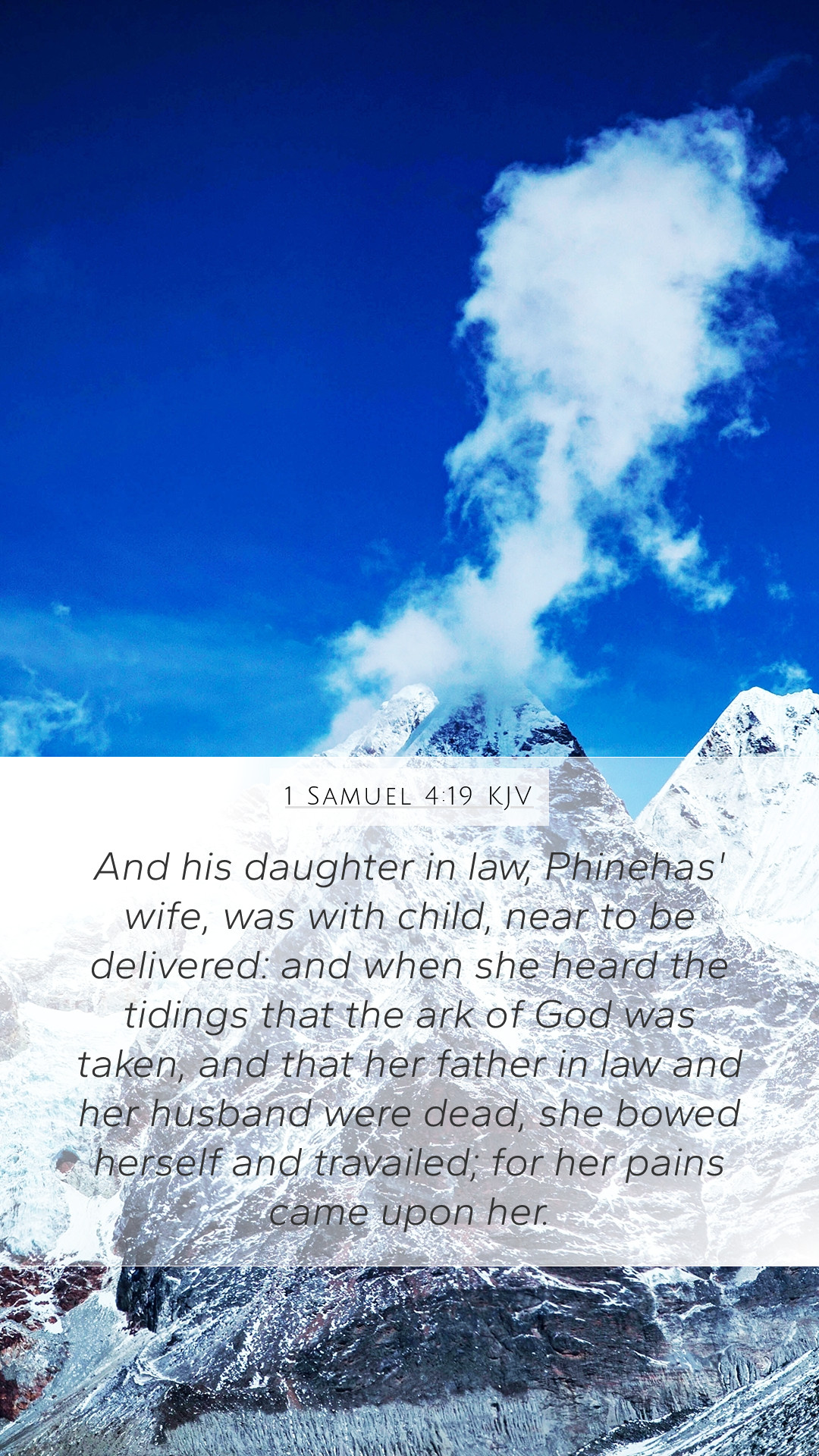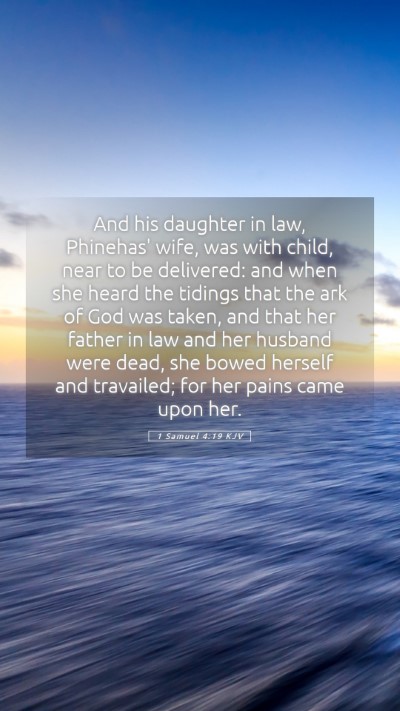Understanding 1 Samuel 4:19
The verse 1 Samuel 4:19 reads: "His daughter-in-law, the wife of Phinehas, was pregnant and about to give birth. When she heard the news that the ark of God had been captured and that her father-in-law and her husband were dead, she went into labor and gave birth, but was overcome by her labor pains." This passage presents a poignant moment in the narrative of Israel’s struggle and signifies deep emotional and spiritual ramifications.
Verse Context and Background
This verse occurs during a time of great turmoil for Israel, particularly marked by the capture of the Ark of the Covenant by the Philistines. The characters within this story—Phinehas' wife, Eli, and the implications of the Ark being taken—are crucial for understanding the broader narrative. The death of Eli, the priest, represents the end of a flawed leadership within Israel. The Ark, a symbol of God's presence, being taken away speaks to the larger themes of loss, divine judgment, and the consequences of sin among the people.
Insights from Commentaries
Matthew Henry
Matthew Henry emphasizes the tragedy that befalls the wife of Phinehas, illustrating how the capture of the Ark not only represents a physical loss but also a spiritual desolation for Israel. He notes that her immediate reaction to the news is indicative of the profound connection between spiritual and emotional states. The guilt and despair resulting from the actions of her husband and father-in-law culminate in her suffering, conveying the seriousness of sin’s consequences not just for individuals but for entire families.
Albert Barnes
Albert Barnes' commentary reflects on the larger implications of grief and loss encapsulated in this moment. He points out that the wife’s labor signifies the physical manifestation of the emotional turmoil she experiences. The tragic passing of her husband and father-in-law at such a pivotal religious moment illustrates the loss of hope and the need for divine intervention. Barnes suggests that her deliverance through childbirth, albeit under duress, may symbolize a fleeting flicker of hope amidst despair.
Adam Clarke
Adam Clarke adds depth by pointing to the cultural and emotional significances tied to childbirth in ancient Israel. He elaborates on the societal expectations surrounding women, particularly expectant mothers, emphasizing that this woman faced not only personal loss but public disgrace alongside pain. Clarke’s commentary suggests that her labor signifies not just the physical act of giving birth but also the birthing of sorrow and a deeper need for restoration in Israel’s relationship with God.
Spiritual Themes and Applications
This verse provides rich ground for theological reflection and personal application, focusing on key themes such as:
- The Consequences of Sin: The actions of Eli's family lead to widespread consequences, reminding readers of the relational aspect of sin and its impact on community.
- The Presence of Suffering: Labor amidst despair illustrates the struggle believers face in life’s trials, reinforcing that pain often accompanies significant spiritual moments.
- The Hope of Redemption: Although the moment is tragic, the continuation of life through childbirth is a reminder of God’s ongoing plan for restoration in the midst of strife.
Cross References
- 1 Samuel 2:30: Discusses God’s judgment on Eli's household.
- 1 Samuel 4:11: The Ark of God is captured, illustrating divine judgment.
- Jeremiah 31:15: Speaks of mourning in connection to childbirth.
Application in Daily Life
Reading this verse invites believers to reflect on their own lives regarding the consequences of sin, the emotional toll of suffering, and the hope of God’s presence even in tragic times. It encourages meaningful engagement with Scripture that transcends merely academic understanding, promoting reflection and application in real-world scenarios.
Conclusion
1 Samuel 4:19 captures a powerful narrative moment that speaks to the heart of biblical teachings on suffering, judgment, and hope. By integrating insights from renowned commentators like Matthew Henry, Albert Barnes, and Adam Clarke, we gain a richer understanding of the text and its implications for our spiritual lives and communal relationships. For those engaged in Bible study groups or seeking deeper scriptural analysis, this passage serves as a profound example of how personal loss can reflect a greater spiritual reality, prompting discussions on practical applications of faith in the face of adversity.
Tags: Bible verse meanings, Bible verse interpretations, understanding Scripture, Bible verse commentary, biblical exegesis, in-depth Bible verse analysis.


